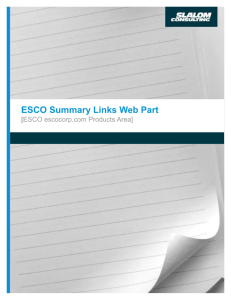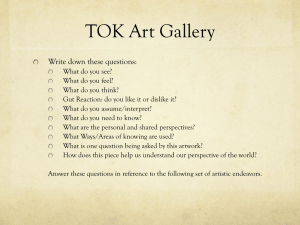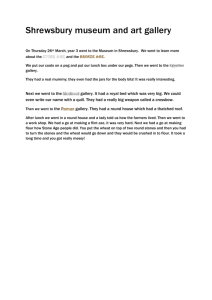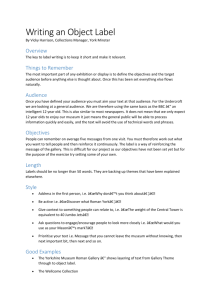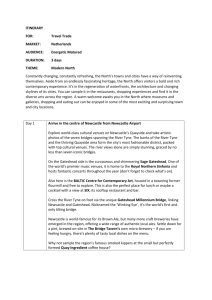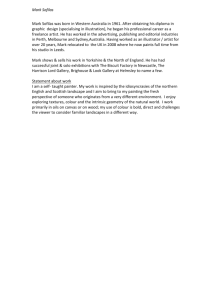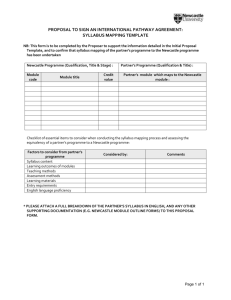091213-DocB - Newcastle University
advertisement
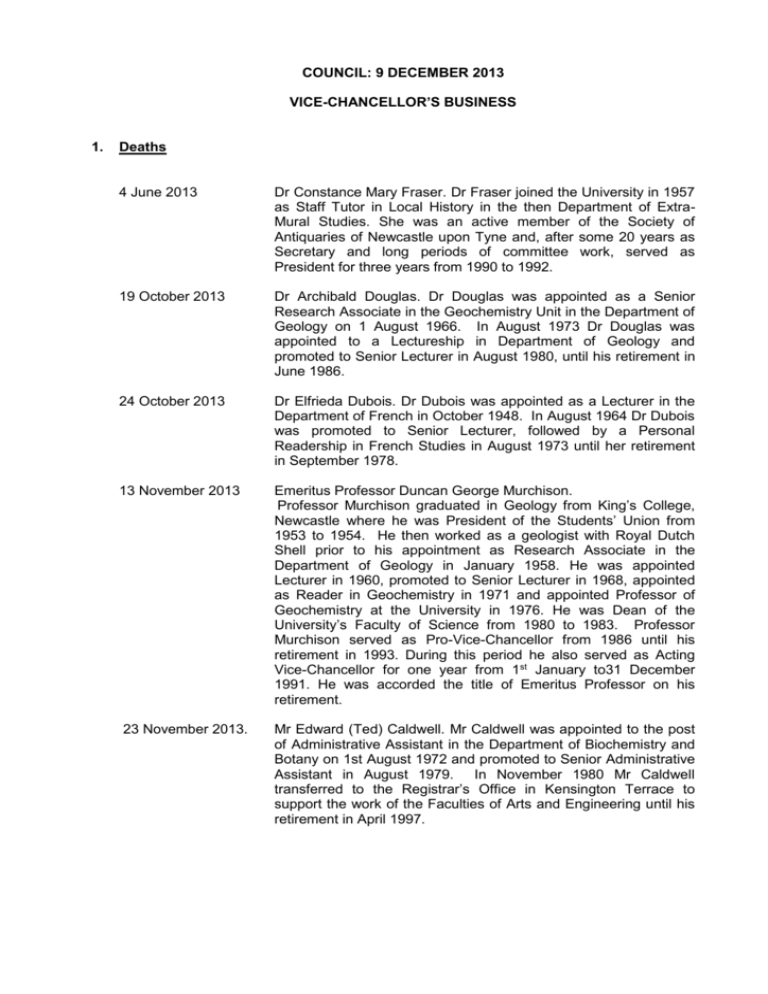
COUNCIL: 9 DECEMBER 2013 VICE-CHANCELLOR’S BUSINESS 1. Deaths 4 June 2013 Dr Constance Mary Fraser. Dr Fraser joined the University in 1957 as Staff Tutor in Local History in the then Department of ExtraMural Studies. She was an active member of the Society of Antiquaries of Newcastle upon Tyne and, after some 20 years as Secretary and long periods of committee work, served as President for three years from 1990 to 1992. 19 October 2013 Dr Archibald Douglas. Dr Douglas was appointed as a Senior Research Associate in the Geochemistry Unit in the Department of Geology on 1 August 1966. In August 1973 Dr Douglas was appointed to a Lectureship in Department of Geology and promoted to Senior Lecturer in August 1980, until his retirement in June 1986. 24 October 2013 Dr Elfrieda Dubois. Dr Dubois was appointed as a Lecturer in the Department of French in October 1948. In August 1964 Dr Dubois was promoted to Senior Lecturer, followed by a Personal Readership in French Studies in August 1973 until her retirement in September 1978. 13 November 2013 Emeritus Professor Duncan George Murchison. Professor Murchison graduated in Geology from King’s College, Newcastle where he was President of the Students’ Union from 1953 to 1954. He then worked as a geologist with Royal Dutch Shell prior to his appointment as Research Associate in the Department of Geology in January 1958. He was appointed Lecturer in 1960, promoted to Senior Lecturer in 1968, appointed as Reader in Geochemistry in 1971 and appointed Professor of Geochemistry at the University in 1976. He was Dean of the University’s Faculty of Science from 1980 to 1983. Professor Murchison served as Pro-Vice-Chancellor from 1986 until his retirement in 1993. During this period he also served as Acting Vice-Chancellor for one year from 1st January to31 December 1991. He was accorded the title of Emeritus Professor on his retirement. 23 November 2013. Mr Edward (Ted) Caldwell. Mr Caldwell was appointed to the post of Administrative Assistant in the Department of Biochemistry and Botany on 1st August 1972 and promoted to Senior Administrative Assistant in August 1979. In November 1980 Mr Caldwell transferred to the Registrar’s Office in Kensington Terrace to support the work of the Faculties of Arts and Engineering until his retirement in April 1997. 2. Updates, Consultations and Reports 2.1 Report on Executive Board business. I have attached my report on business considered by Executive Board between 22 October and 19 November 2013. Annex 1 2.2 Pay negotiations and industrial action The Chair of Council has approved the UCEA recommendation to implement the 1% pay increase in December. The increase will be backdated to 1st August 2013. The recommendation is made despite continuing industrial action. Discussions are continuing at a national level, but there is currently no resolution. A joint strike day took place on 31 October and UCU advised that its members would ‘work to contract’ from 1 November. Further industrial action is scheduled to take place on 3 December. I will ask the Executive Director of HR to update Council at the meeting. 2.3 Feedback from the Vice-Chancellor’s visits abroad I have recently returned from visits to our overseas campuses in Malaysia and Singapore, and to our strategic partners in China (Xiamen), Australia (Monash) and Indonesia (Universitas Indonesia). Some key points from my visits are outlined below. Singapore I met the new President of the Singapore Institute of Technology (SIT), Professor Tan Thiam Soon. He outlined his strategy for the development of SIT as Singapore’s newest (= 5th) university. I confirmed that we wish to continue to develop our relationship with SIT as a major strategic partner within the context of this strategy. I led a delegation to Nanyang Technological University, to renew an MoU. NTU is under the vigorous leadership of President Bertil Andersson, and has made spectacular leaps up the league tables over the past few years. This is a collaboration well worth following up on the research front, and NTU will have some league table tactics worth considering. NUIS hosted an alumni event, at which I was the guest of honour. Singapore is our most active and most loyal overseas alumni branch, Malaysia I have now visited the accommodation used by our students at the “International Student Village” (actually a single building). It is poorly designed, poorly built and poorly managed. It is possible that there will always be some demand for rooms in that building from some of our students, because it is much cheaper than anything else available, and (so far) the only accommodation available on campus. We should however, scope out alternatives, and I have asked the Executive Director Finance to look into this. I also visited the Sports Centre, which is very good, and likely to be managed by Gateshead College. The difficulty here seems to be that students will not have access to the facilities without paying, so some negotiation on behalf of our students seems to be indicated. Xiamen Xiamen University is one of our international Strategic Partners, along with Groningen, Monash and SIT. We have proposed, and they have accepted, a joint and equal 2 partnership with them for our two Business Schools to offer an International Management programme as a dual degree. A joint Strategic Partnership Board has now been constituted, with three senior representatives from each university (from Newcastle: Professors Ella Ritchie, Charles Harvey and Steve Hughes), and each side has a nominated lead person (Prof Hughes at our end). Monash We have long considered Monash as one of our main strategic partners considered but it is fair to say that the relationship has had a few wobbles. I went there with the PVC Medical Sciences to re-focus the relationship on Medical Sciences, building on a longstanding collaboration in Neuroscience. My impression is that there is still a good chance of cementing the relationship with Monash, and a will to do so on both sides. Universitas Indonesia We already have an MoU with Universitas Indonesia, but the itinerary provided an opportunity to call in at Jakarta to renew the agreement and gain some profile. I gave a lecture, we renewed the MoU, and we visited their Centre for Ageing. Indonesia is the 4th largest nation on earth, yet it is still terra incognita for many UK universities. It makes good strategic sense to have a foothold there which could be turned into firstmover advantage as and when an opportunity presents itself. 3. Learning and Teaching 3.1 HEFCE Postgraduate Support scheme Newcastle University is a member of a consortium, led by Sheffield and including to University of Leeds, University of Manchester, University of York, and University of Warwick, which has been successful in gaining funding from HEFCE’s Postgraduate Support Scheme. The project aims to investigate factors affecting widening access to postgraduate study and the professions and provides over £4M to be delivered to support postgraduate students across the consortium. Newcastle’s specific role is to model the postgraduate taught landscape through qualitative and quantitative data gathering in order to develop an understanding of motivations and barriers to PGT study for students. 4. Research matters 4.1 Doctoral Training Partnership We have had notification that our NERC IAPETUS Doctoral Training Partnership bid was successful. IAPETUS is named after the ancient ocean that closed to bring together Northern England and Scotland and this reflects the make-up of our consortium; we will be working with Durham (co-ordinators), Glasgow, St Andrews and Stirling, together with the British Geological Survey and the Centre for Ecology & Hydrology. The consortium will receive £5 million from NERC. This is sufficient to fund in excess of 60 PhD studentships over the next five years. 4.2 Centre for Doctoral Training in Digital Civics It has been announced that the University has been successful in its application for funding from EPSRC to launch a Centre for Doctoral Training in Digital Civics. Led by Professor Patrick Olivier and Peter Wright in Computing Science, the Centre will train a 3 new generation of researchers to investigate how digital technology can be used to redesign local services which will better meet the needs of society. Working with businesses, the public sector and local communities, the CDT will focus on the use of digital technologies in the provision of education, public health and social care, planning and local democracy. The Newcastle CDT is a partnership between Newcastle University, local government (Northumberland, Gateshead and Newcastle councils), local and national NGOs, international technology companies, and many of the world¹s leading universities in North America, Asia, Europe and Australasia. 4.3 Research Excellence Framework (REF) 2014 We submitted our REF return on 27 November 2013. I will ask the PVC Research and Innovation, Professor Wright, to update Council members at the meeting. 5. Internal Matters 5.1 George Brown Endowment Fund: Request for funds to support the Hatton Gallery Campaign The Hatton Gallery is one of Newcastle University’s key cultural assets. However, there has been no major investment in its fabric and infrastructure in the past 30 years. This is now significantly impeding the University in its ambitions to provide a high quality venue for the display of historic and contemporary art, to care for a listed building with an important collection, and to engage fully with visitors and learners. A capital re-development project is planned to transform the Hatton Gallery and a major fundraising campaign was launched on Monday 18th November. We wish to request £500,000 from the George Brown Endowment to support the capital works. University Endowments Group has confirmed the suitability of the George Brown Fund for this project and the amount available. Financial commitment from the University is requested now in order to maximise partnership funding for the project. Releasing income from this fund requires the approval of Senate and Council following a proposal by the Vice-Chancellor. I believe this is a worthwhile use of the fund. Senate approved this on the 26 November and I recommend approval by Council to release the funds to support this worthy cause. Annex 2 5.2 Donation At the meeting of Council on 28 October I advised members that we had received notification of an unrestricted legacy of over £500,000 from a retired member of staff, Dr Constance Mary Fraser. Dr Fraser joined the University in 1957 as Staff Tutor in Local History in the then Department of Extra-Mural Studies. She was an active member of the Society of Antiquaries of Newcastle upon Tyne and, after some 20 years as Secretary and long periods of committee work, served as President for three years from 1990 to 1992. The donation has now been confirmed for the amount of £524k. Council is asked to approve this donation to the University. 4 5.3 Newcastle University Information Technology (NUIT) Executive Board has agreed to establish NUIT, the University’s unified approach to delivering IT service. This will strengthen our performance in underpinning research and teaching, by ensuring that our IT experts are aligned and working together. NUIT will create a community of like-minded professionals who can share approaches, ideas and expertise. Three Faculty IT Managers will be recruited, reporting initially to the Director of NUIT but located in each Faculty. Once each is in place, professional IT staff located in each Faculty will change reporting line to the Faculty IT Manager. Budgets for staff and for standard IT equipment and services will transfer. Day-to-day priority setting will continue to rest with the local academic or service unit. These changes will improve consistency, minimise risk and improve cover. They will provide both a lead advocate for each Faculty and a professional development path for IT staff. 5.4 University Visit days 2014 As members of Council will know, Visit Days are held each year for prospective undergraduate students and their families to visit the University prior to applying. Combined attendance for the 2013 Visit Days was the highest ever, with a total of 36,500 visitors. The Visit Days for 2014 will be on Friday 27 and Saturday 28 June and Saturday 27 September 2014. External Matters 6.1 Queens’ Anniversary Prize 2014 I am delighted to confirm that Newcastle University has been announced as a winner of the Queen’s Anniversary Prize for its pioneering research into rural economies and societies. The Prize was announced at a special reception at St James’s Palace on the 21st November, which I attended with the University’s Chancellor, Sir Liam Donaldson. It was awarded to the University for our internationally recognised research into sustainable rural economies and societies, led by the Centre for Rural Economy, which has influenced policy and practice around the world. Queen’s Anniversary Prizes are awarded by the Royal Anniversary Trust to honour work of outstanding importance and quality in higher and further education in the UK. The winners in the Tenth Round of the Queen’s Anniversary Prizes will have their awards presented at a ceremony in February 2014. This is the third occasion on which Newcastle University has been awarded a Queen’s Anniversary Prize. Previously the University gained the Prize in 2005 for its innovative solutions to mine water pollution, and again in 2009 for research into ageing. By recognising the University’s excellence in the field of rural economy research, this latest Prize means that research being carried out under all three of the themes has now been recognised, making for a sector-leading ‘hat trick’ of Anniversary Prizes. Our aim at Newcastle is to conduct world-class research that directly addresses the biggest issues of the day, and the work being carried out by the Centre for Rural 5 Economy is an excellent example of what this means in practice. Philip Lowe, Mark Shucksmith, Guy Garrod and their teams are looking at some of the world’s most pressing challenges, from how we use land, to the changing relationships between rural and urban communities and how we tackle social exclusion. The announcement of this award is testament to their hard work and I know you will join me in congratulating them on this richly deserved accolade. This year the Centre for Rural Economy celebrates its 21st anniversary. On the 27th November, a £2.5 million fundraising campaign to secure the Centre’s future and maintain our position at the forefront of rural economy research was launched at Alnwick Castle. So this news could not have come at a more appropriate time. 6. Late News Updates on items received after this report goes to press will be reported at the meeting. 7. Early warnings Any early warnings will be brought to Senate’s attention at the meeting. Professor Chris Brink Vice-Chancellor 2 December 2013 6 Annex 1 Executive Board business considered between 22 October and 19 November 2013 October 1. Preparation for the REF: Faculty of Medical Sciences 2. Preparation for the REF: Faculty of H&SS 3. Preparation for the REF: Faculty of SAgE 4. Interim HR plan : Medical Sciences 5. USA Strategy 6. New University Research Centre 7. Sale of property update November 8.School of Medical Sciences Educational Development 9. The future of Ageing 10. Learning, Teaching and Student Experience Strategy 11. Approach to Car parking and vehicle management 12. Senate meeting 26 November 2013 13. INTO Annual Report 2012-13 15.Honours Degree Classification 16. New University Research Centre 17.Council meeting 9 December 2013 18.Institutional KPI summary 19.Review of Student Rents 2014/15 20.HR strategic progress report 21.Equality Strategy 22.Equality and Diversity Annual Monitoring Report 2013 24.FutureLearn 25.Raising the Bar: update on senior appointments 26.Undergraduate applications 2014 entry 27.Postgraduate applications 2014 entry PVC Medical Sciences PVC H&SS PVC SAgE PVC Medical Sciences DVC/PVC H&SS PVC R&I PVC Medical Sciences PVC Medical Sciences PVC L&T Registrar Registrar PVC P&R PVC L&T PVC R&I Registrar PVC P&R Registrar Executive Director of HR Executive Director of HR Executive Director of HR PVC L&T Executive Directors of HR and Finance PVC L&T PVC L&T Ruth Draper Secretary to EB 2 December 2013 7 Annex 2 Annex 2 Revitalising Newcastle’s Hatton Gallery: Request for funds from the George Brown Endowment 1 Purpose of the funding The Hatton Gallery is one of Newcastle University’s key cultural assets. However, there has been no major investment in its fabric and infrastructure in the past 30 years. This is now significantly impeding the University in its ambitions to provide a high quality venue for the display of historic and contemporary art, to care for a listed building with an important collection, and to engage fully with visitors and learners. A capital re-development project is planned to transform the Hatton Gallery. The capital works will create a welcoming and engaging gallery experience by: conserving the historic architectural elements of the Gallery and the entrance foyer; refurbishing the galleries and ancillary spaces to modern standards; conserving Kurt Schwitters’ Merzbarn Wall and selected items from the collection; creating a dedicated Learning Space and Collections Access Room. This will be complemented by a creative programme of exhibition, learning and training activities to develop new and existing audiences and raise awareness of the Hatton as a distinctive cultural venue. This is a partnership project with Tyne & Wear Archives and Museums (TWAM), which manages the Gallery and the Great North Museum on behalf of the University. It is a strategic University project, championed by Professor Ella Ritchie OBE, Deputy Vice-Chancellor. 2 The benefits of the project to the University The Hatton Gallery is Newcastle University’s public art gallery, which has played a significant role in modern art history. The Gallery offers a distinctive atmosphere and sense of place, which embodies the University’s civic pride and provides visitors with a unique cultural experience. Fine Art teaching and research have given the Gallery a distinctive character, and a history that is intertwined with important developments in art and art education in the North East and across the UK. This project is important to the University as it will: safeguard heritage at risk: the Grade II listed building, the Gallery’s collection and archive, and Kurt Schwitters’ Merzbarn Wall; build on major investments in the Great North Museum and on campus; take advantage of new opportunities with national arts organisations, eg. Tate; improve the visitor experience; support fine art and gallery studies scholarship, and encourage learning for all ages and abilities; maximise partnership funding from the Arts Council England’s Catalyst Arts scheme; and make a positive statement about the importance of heritage and the arts to Newcastle. Together, the capital project and activity programme will enable the Hatton to fulfil its potential as a cultural, heritage and educative force regionally, nationally and internationally. 3 Funding requested and timescale We wish to request £500,000 from the George Brown Endowment to support the capital works. University Endowments Group has confirmed the suitablility of the George Brown Fund for this project and the amount available. It will cost £3.47m to transform the Hatton Gallery into a distinctive cultural venue; this comprises £2.82m for the capital works and £650,000 for the gallery programme. Under the current project timetable, the Hatton Gallery will close in February 2016 and re-open in July 2017. Financial commitment from the University is requested now in order to maximise partnership funding for the project. 4 Financial contributions from other sources The University’s Development and Alumni Relations Office, in partnership with TWAM, is leading the fundraising for this project. We have secured £204,000 and hope to receive a stage one pass from Heritage Lottery Fund (HLF) in March 2014 for £2.28m. We aim to raise the balance from trusts and foundations (£400,000) and individuals (£80,000). A fundraising campaign will be launched on 18 November and all eligible donations will be match funded by the Arts Council England’s Catalyst Arts scheme until May 2015 HLF is the only funder with the ability to provide major investment to the project and is supportive of the project. HLF’s Board deemed the Hatton project as a strong, high priority, but was not able to support our previous £2.8m applications due to insufficient funds in the national grantmaking budget. HLF has strongly encouraged a re-application but advised that the University needs to create demand for the project to happen now. The suggested approach is to secure additional partnership funding from either internal or external sources which will build a sense of urgency along with reducing the HLF grant request. Approval of this request will provide a compelling case for support to the Heritage Lottery Fund and crucial leverage for investment in the project. Significant financial commitment from the University is potentially transformative for the Hatton Gallery. It will demonstrate commitment to this key cultural asset and most of all, genuinely build a sense of urgency for the project to go ahead. 5 Implications if funding is not given This strategic project will be at risk if additional partnership funding cannot be secured. Without the University’s investment, the partnership funding secured to date, the potential investment from the Heritage Lottery Fund and the viability of the Hatton Gallery are at risk. The Heritage Lottery Fund will only accept a further application if there is a significant change to the project. The only viable change, without compromising the ambition for the Gallery, is to increase the partnership funding committed to the project. Newcastle University will not be able to re-submit its application for £2.28m to the Heritage Lottery Fund, if this funding request is not supported. If significant investment cannot be secured for the Hatton, the run down appearance of its galleries coupled with the need to renew services brings into question the future viability of the Gallery as a functioning and vibrant venue for the display of historic and contemporary art. Suzanne Davies Trusts and Foundations Manager Professor Ella Ritchie Deputy Vice-Chancellor On behalf of Executive Board 27 November 2013
